Building independence skills in children with autism isn’t just a developmental milestone; it’s a gateway to self-reliance and a better quality of life. 🌟 By nurturing these essential skills, caregivers can boost their child's confidence and social interactions, paving the way for better educational and job opportunities down the line.
But let’s be real - the journey to independence can be challenging. How can caregivers effectively assess and nurture these skills in a way that truly resonates with each child's unique needs? 🤔 This article dives into practical steps to empower children with autism, equipping caregivers with the tools they need to support their growth toward independence.
Let’s explore this together!
It is crucial for kids with autism to focus on building independence skills in children with autism. They help promote self-reliance and boost confidence! These skills include everyday tasks like personal hygiene, meal prep, and social interactions. When we nurture independence through building independence skills in children with autism, they can see big improvements in their self-esteem and social connections, leading to a better quality of life. Research shows that building independence skills in children with autism can open up more educational and job opportunities, paving the way for a fulfilling adult life.
Task analysis plays a key role in teaching these new skills, breaking down complex tasks into manageable steps. Plus, establishing routines is crucial! Routines provide structure and predictability, helping kids thrive.
At Rori Care, we’re all about empowering caregivers through education. We equip you with the knowledge and skills you need to support your child’s development effectively. This support not only complements professional interventions but also promotes consistency at home, leading to better behavioral outcomes. When caregivers understand ABA principles, they can make informed choices that positively impact their child’s progress, creating a collaborative environment for growth. Our services, including individual and group therapy, are designed to support building independence skills in children with autism on their journey toward independence.
Understanding the average cost of therapeutic behavioral services can really help families make informed decisions about investing in their child’s development. Let’s explore this together!
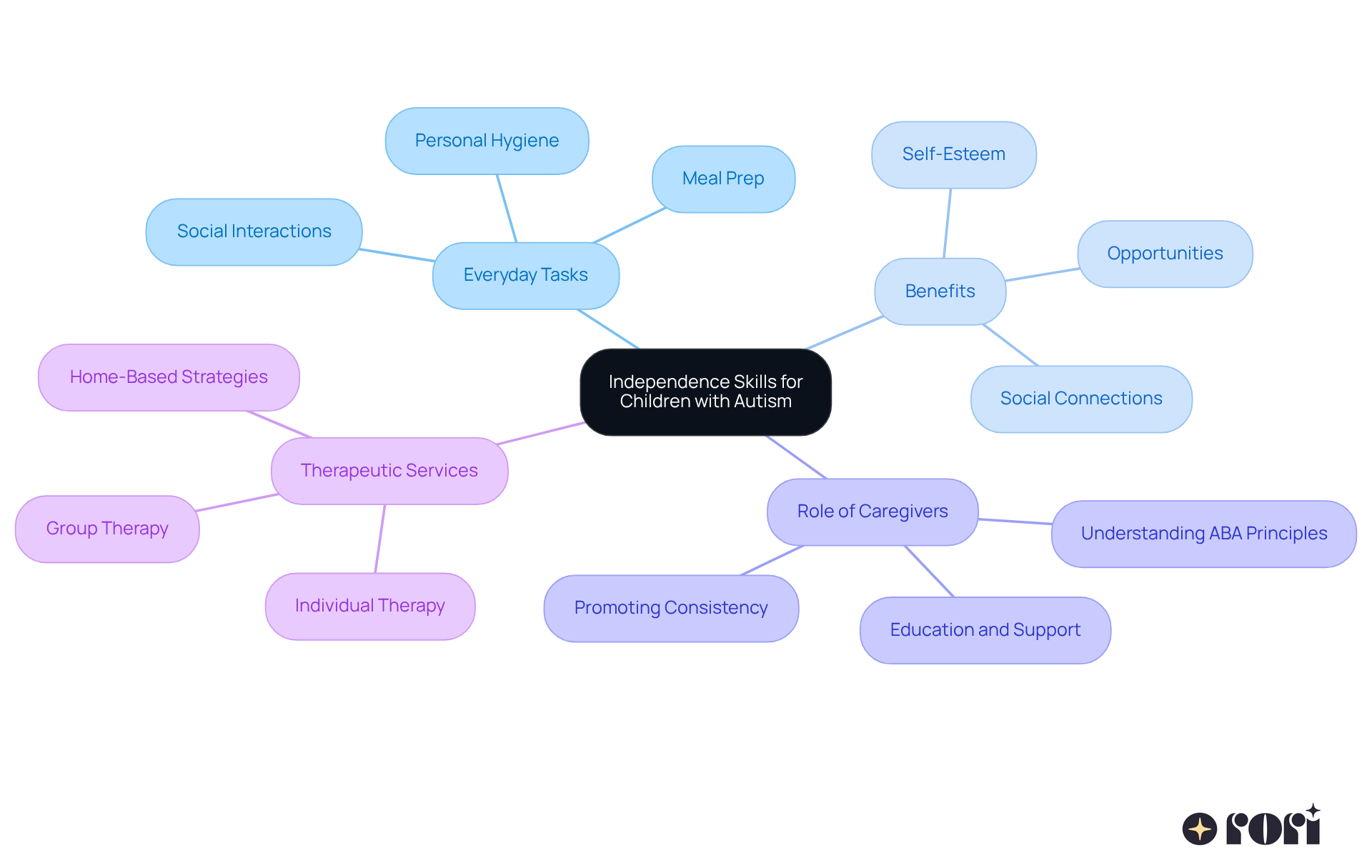
Start by taking a good look at your child's current abilities. You can do this through direct observation, standardized evaluations, and feedback from caregivers. This step is super important for building independence skills in children with autism, as it helps in spotting strengths and weaknesses in areas like self-care, communication, and social skills. For example, if your child can dress themselves but struggles with personal hygiene, it’s time to focus on improving those hygiene habits. Keeping track of these observations helps build a complete picture of your child's skills, which is the first step in creating a personalized training plan.
Research shows that early and intensive behavior treatment can be effective in building independence skills in children with autism, resulting in lasting improvements in cognitive, social, and adaptive skills. This highlights just how crucial tailored interventions can be! As Ralph Moller points out, a personalized treatment plan for building independence skills in children with autism should cater to the unique needs and preferences of each child, ensuring that the strategies used effectively tackle their specific challenges.
Involving the family in therapy sessions can really boost outcomes. When families participate, they can reinforce what’s learned and create a supportive environment for their loved ones with autism. Plus, when supporters are educated about ABA principles and strategies, they can make informed choices that positively impact their child's progress. This leads to better behavioral outcomes and strengthens family dynamics.
Did you know that 90% of young individuals show significant progress when the recommended hours are followed with active caregiver involvement? This really emphasizes how effective ABA therapy can be! And remember, treatment plans can be adjusted based on progress reports, ensuring that they continue to meet your child's evolving needs. Let’s explore this together!
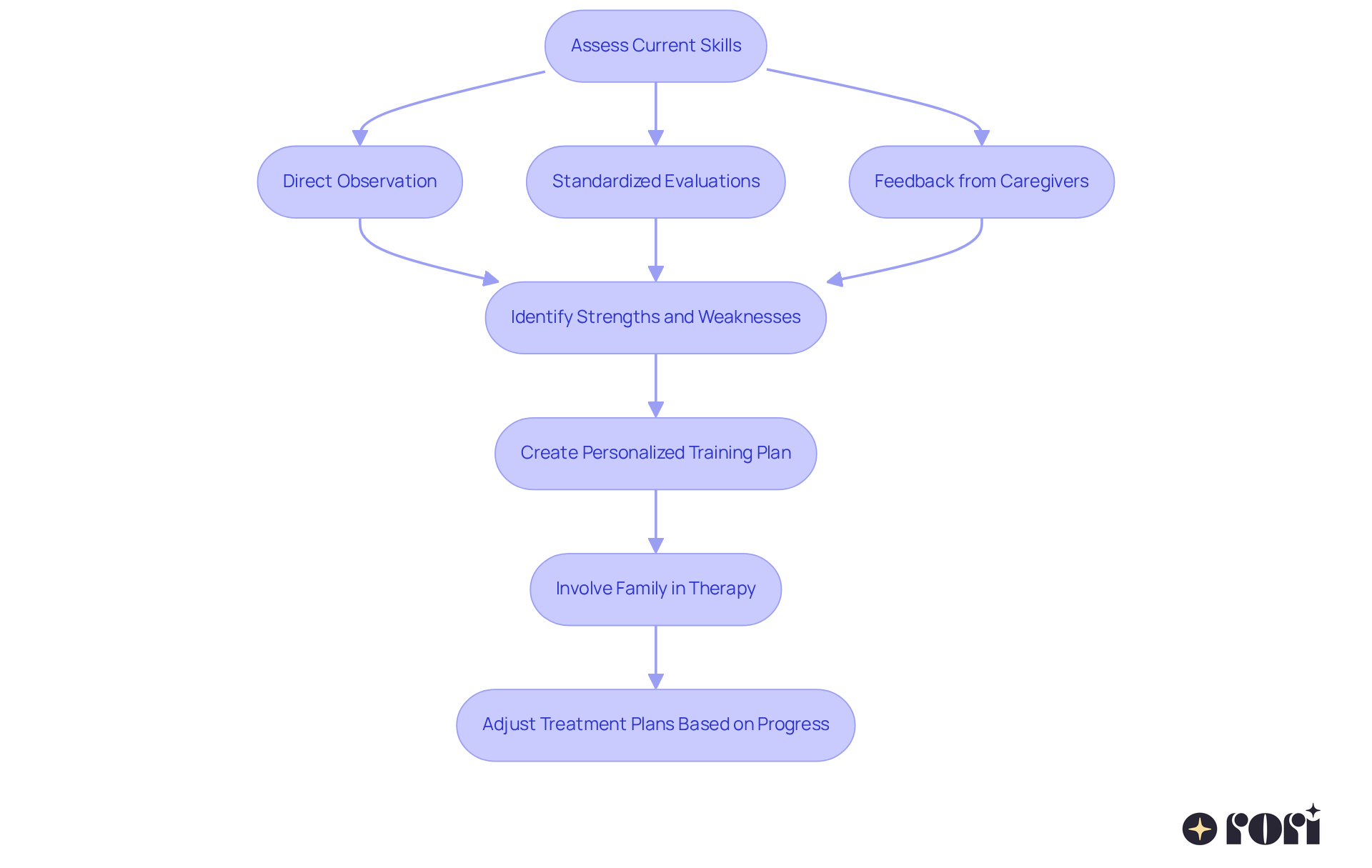
When it comes to teaching daily living activities, breaking things down can really help! Think about task analysis, which is all about taking those complex tasks and splitting them into smaller, manageable steps. For instance, if you’re helping a little one brush their teeth, start with the very first step: picking up the toothbrush.
Using visual aids, like picture schedules, can make each step super clear and accessible. It’s like having a roadmap for success! And don’t forget about role-playing! Creating a safe space for practicing these skills can really boost understanding through real-life application.
Consistency is key here! Regular practice not only builds these skills but also contributes to building independence skills in children with autism, helping your child gain confidence and paving the way for greater independence. So, let’s explore this together and see how we can make daily living activities a fun learning experience!
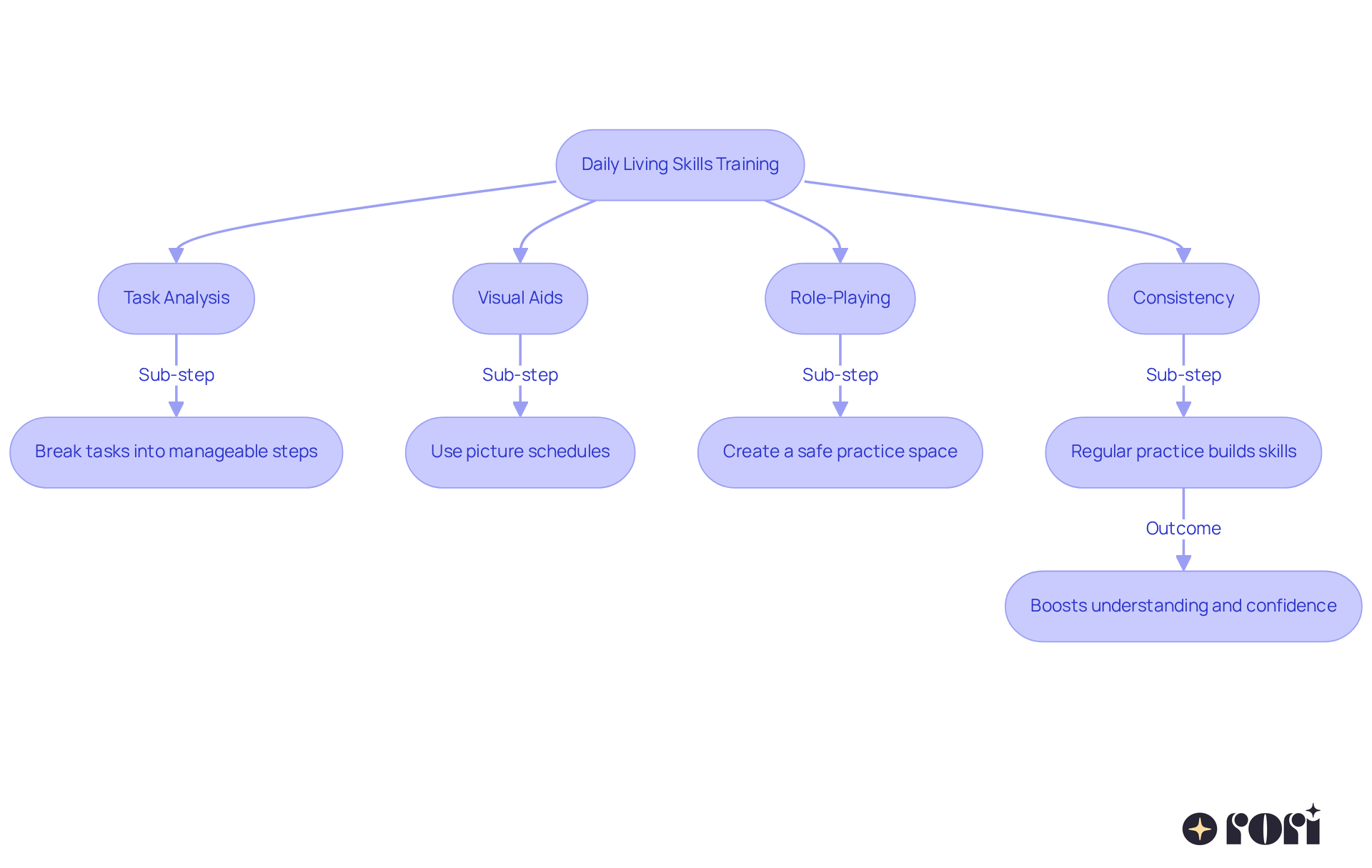
Let’s talk about how positive reinforcement can really make a difference in building independence skills in children with autism! 🌟 Using techniques like verbal praise, tangible rewards, or even extra playtime can encourage those desired behaviors. For example, when a young one successfully completes a task, a simple sticker or a fun activity can reinforce their achievement and motivate them to keep going.
Creating a structured learning environment is super important for building independence skills in children with autism. Keeping consistent routines and using visual schedules to outline daily activities can contribute to building independence skills in children with autism, helping them feel more secure and focused. Imagine how much easier mornings can be when they know exactly what to expect! Research shows that organized settings can reduce anxiety and lead to better behavioral outcomes, which are essential for effective education and therapy, especially in building independence skills in children with autism.
Did you know that about 64% of individuals on the spectrum use Applied Behavior Analysis (ABA) therapy? This really highlights how crucial structured environments are for effective learning. The Autism Society of America emphasizes the importance of teamwork among individuals on the spectrum, their supporters, and multidisciplinary teams. This collaboration is key to successfully applying positive reinforcement strategies aimed at building independence skills in children with autism.
Empowering caregivers with knowledge about ABA principles can enhance their ability to support their child’s behavioral goals, leading to better results. However, it’s not always easy for parents to access these services. That’s why advocacy and support are so important in navigating the care landscape for individuals with developmental disorders. We’re here to help you every step of the way! If you have any thoughts or experiences to share, we’d love to hear from you!
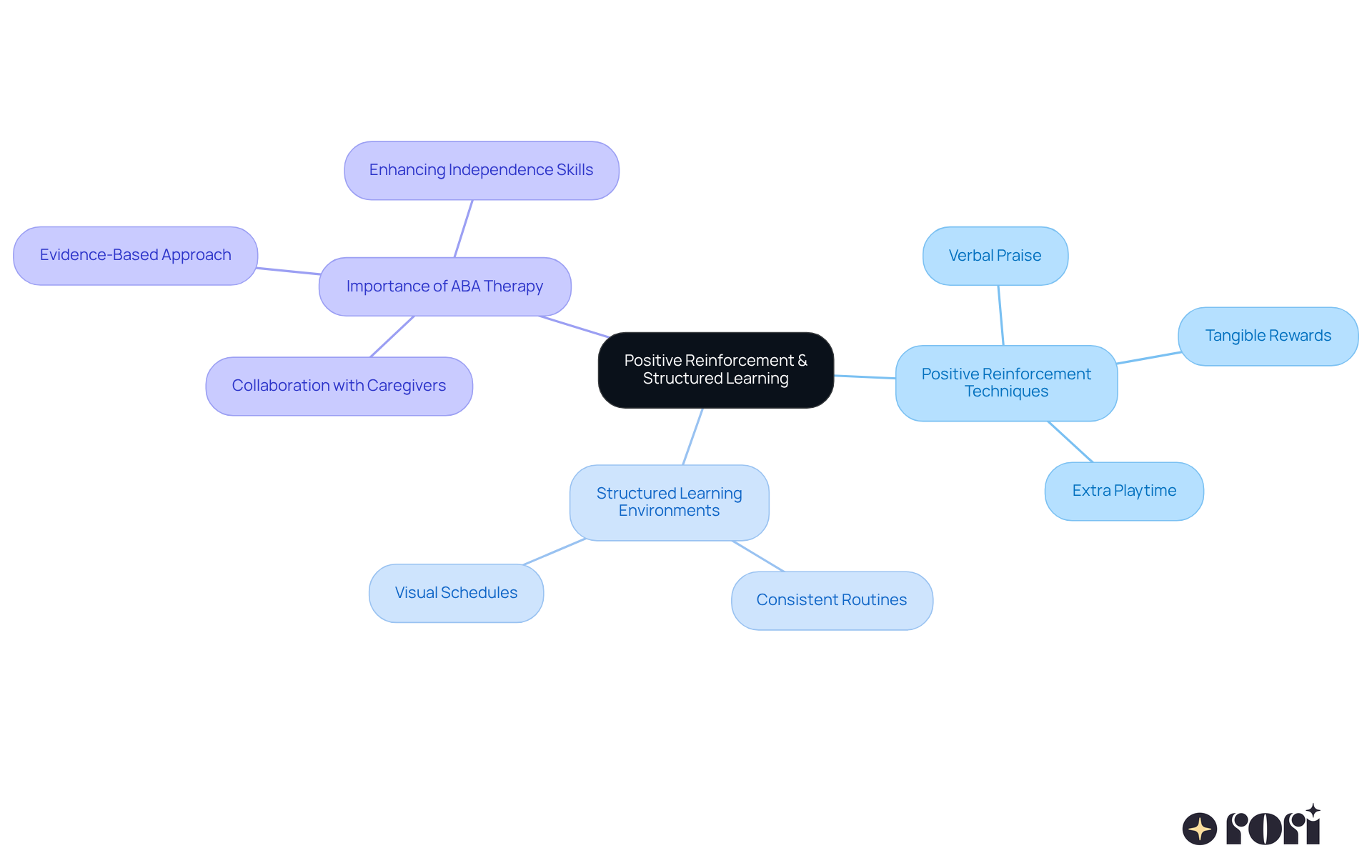
Consistent interaction between caregivers and professionals is vital for building independence skills in children with autism. When everyone shares progress updates, discusses challenges, and swaps effective strategies, it creates a unified approach to care. This teamwork helps reinforce skills in different settings.
For example, if a little one is learning to prepare a snack at home, using the same techniques during therapy sessions can really boost their skill retention. Isn’t that neat? Research shows that 90% of individuals make significant progress when they receive the recommended hours of Applied Behavior Analysis therapy, especially when their guardians are actively involved.
Caregivers who understand ABA principles can make informed choices that positively impact their child’s progress, leading to better behavioral outcomes. Plus, effective communication between support providers and autism specialists is key. In fact, 91% of autism professionals believe that person-centered methods are the most effective.
By collaborating, caregivers and professionals can foster a supportive environment that encourages skill generalization, ultimately contributing to building independence skills in children with autism. Let’s explore this journey together!
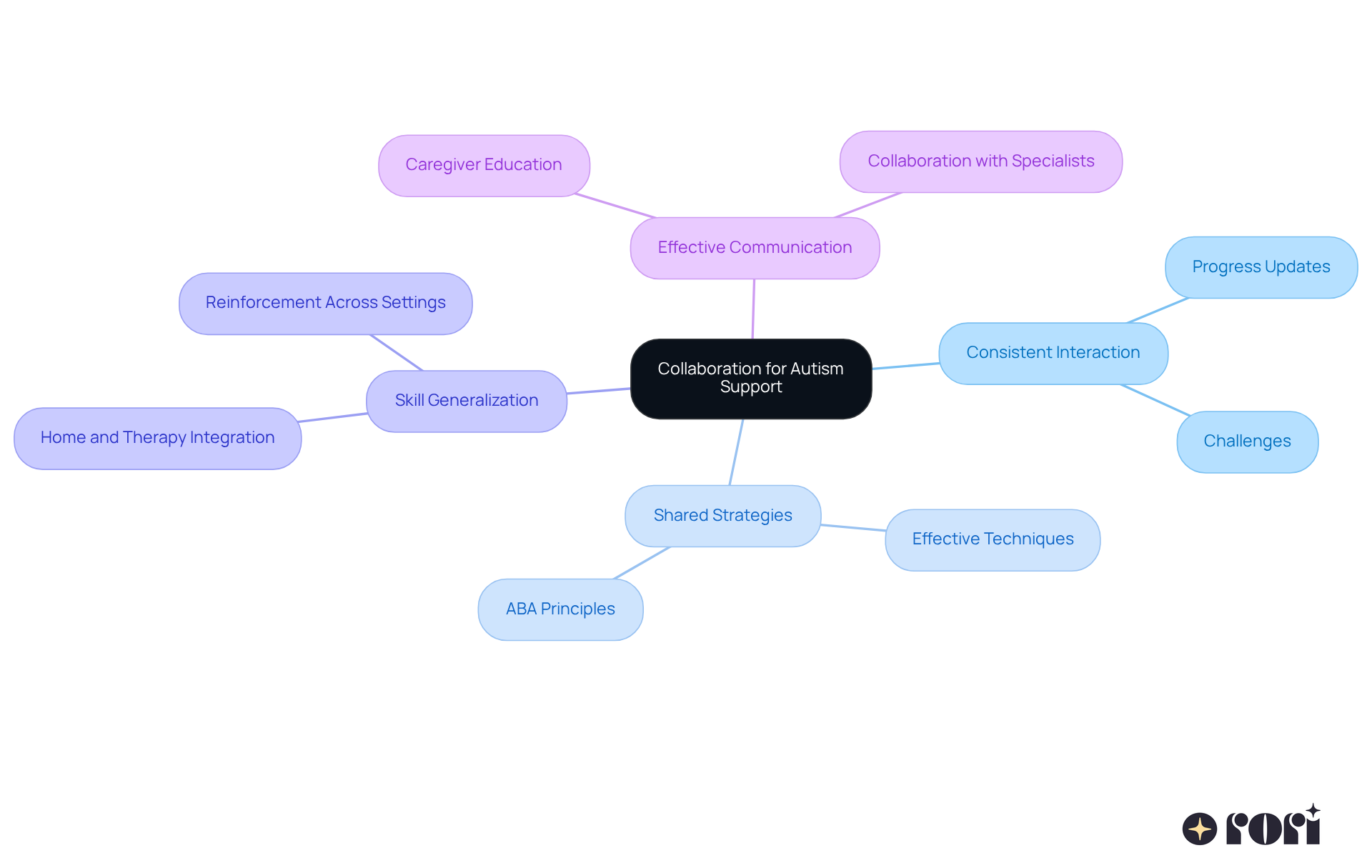
Building independence skills in children with autism is so important for helping them become self-reliant and improving their overall quality of life. When we nurture these skills, we empower our kids to tackle daily tasks with confidence, which can really boost their self-esteem and help them connect with others. Focusing on independence not only sets the stage for a fulfilling childhood but also opens up exciting educational and job opportunities down the line.
Throughout this article, we’ve highlighted some key strategies for developing these essential skills. It all starts with understanding where your child is right now. From there, implementing daily living skills training, using positive reinforcement, and fostering collaboration between caregivers and professionals are all crucial steps. Each of these actions helps create a structured and supportive environment that encourages growth and learning.
Ultimately, the journey toward independence for children with autism is a team effort. Caregivers, educators, and therapists all play a vital role. By embracing effective strategies and keeping the lines of communication open, we can work together to create a nurturing atmosphere that promotes skill retention and generalization. Investing time and resources into building these independence skills is truly invaluable, as it can significantly shape the developmental path of autistic children, paving the way for a brighter future. Let’s explore this together!
Why is it important for children with autism to build independence skills?
Building independence skills in children with autism promotes self-reliance and boosts confidence. These skills lead to improvements in self-esteem and social connections, ultimately enhancing the quality of life.
What types of independence skills should children with autism focus on?
Children with autism should focus on everyday tasks such as personal hygiene, meal preparation, and social interactions.
How does task analysis aid in teaching independence skills?
Task analysis breaks down complex tasks into manageable steps, making it easier for children to learn and master independence skills.
Why are routines important for children with autism?
Routines provide structure and predictability, helping children thrive by creating a stable environment for learning and development.
How can caregivers support their child's development of independence skills?
Caregivers can support their child's development by being educated on ABA principles, participating in therapy sessions, and reinforcing learned skills at home.
What role does family involvement play in therapy for children with autism?
Family involvement boosts outcomes by reinforcing what is learned in therapy and creating a supportive environment, leading to better behavioral outcomes.
What is the significance of personalized treatment plans for children with autism?
Personalized treatment plans cater to the unique needs and preferences of each child, ensuring that strategies effectively address their specific challenges.
How does early and intensive behavior treatment impact children with autism?
Research shows that early and intensive behavior treatment can lead to lasting improvements in cognitive, social, and adaptive skills for children with autism.
What is the average success rate of young individuals with autism when caregiver involvement is active?
Approximately 90% of young individuals show significant progress when the recommended therapy hours are followed with active caregiver involvement.
Can treatment plans for building independence skills be adjusted?
Yes, treatment plans can be adjusted based on progress reports to ensure they continue to meet the evolving needs of the child.